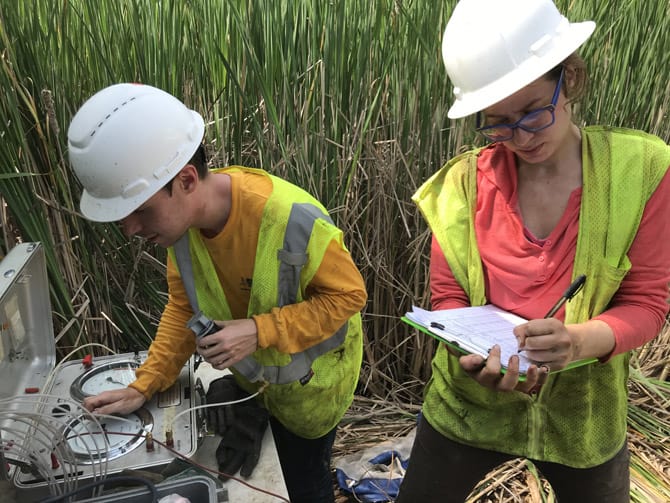
What Is a BSE in Civil Engineering?
Civil engineers design, plan, and improve the built environment and infrastructure systems, including buildings, power generation facilities, water supply networks, pollution control works, flood protection structures, dams, and canals, as well as vital network systems for commerce such as roadways, airports, railroads, and ports. Civil engineering encompasses several subdisciplines, including hydraulics and hydrology, structural, geotechnical, construction, environmental, civil engineering materials, and transportation engineering.
Coursework in the major builds especially on a strong foundation in math and physics, and exposes students to these subdisciplines. An emphasis in the sustainable engineering of civil infrastructure is also provided by the curriculum.
Main Focus Areas:
- Construction Engineering and Management
- Environmental Engineering
- Geotechnical Engineering
- Hydraulics and Hydrological Engineering
- Materials Engineering
- Structural Engineering
Sample Schedule
Year 1
Semester 1 (17 units)
- Calculus I (Math 115) (4)
- Chemistry (125/126 and 130 or 210 (3) and 211)(5)
- Engineering 100 (4)
- Intellectual Breadth (4)
Semester 2 (17 units)
- Calculus II (Math 116) (4)
- Physics (140 and 141) (5)
- Engineering 101 (4)
- Intellectual Breadth (4)
Year 2
Semester 1 (16 units)
- Calculus III (Math 215) (4)
- Physics (240 and 241) (5)
- Statics and Dynamics (CEE 211) (4)
- Thermodynamics and the Environment (CEE 230) or Sustainable Engineering Principles (CEE 265) (3)
Semester 2 (15 units)
- Differential Equations (Math 216) (4)
- Intellectual Breadth (4)
- Intro to Civil & Environmental Engineering (CEE 200) (1)
- Solid and Structural Mechanics (CEE 212) (3)
- Sensors and Circuits (CEE 375) or Sustainable Engineering Principles (CEE 265) (3)
Year 3
Semester 1 (15 units)
- Statistical Methods (CEE 373) (3)
- Fluid Mechanics (CEE 325) (4)
- Two Program Electives (8)
Semester 2 (16 units)
- Computational Methods (CEE 303) (4)
- Two Program Electives (8)
- General Elective (4)
Year 4
Semester 1 (17 units)
- Science Elective (3)
- Two Program Electives (8)
- Technical Elective (3)
- General Elective (3)
Semester 2 (15 units)
- Intellectual Breadth (4)
- Professional Issues & Design (CEE 402) (4)
- Technical Elective (3)
- General Elective (4)
Electives
Program Electives
- CEE 312 (4): Structural Engineering (F)
- CEE 331 (4): Construction Management (W)
- CEE 345 (4): Geotechnical Engineering
- CEE 351 (4): Civil Engineering Materials
- CEE 365 (4): Environmental Engineering Principles (F)
- CEE 421 (4): Hydrology and Floodplain Hydraulics (F)
- CEE 450 (4): Introduction to Transportation Engineering (W)
Science Electives
- CEE 482/582 (3): Environmental Microbiology (F)
- BIOLOGY 171 (3): Introductory Biology: Ecology and Evolution
- BIOLOGY 172 (3): Introductory Biology: Molecular, Cellular, and Developmental
- BIOLOGY 174 (3): Introduction to Cellular and Molecular Biology
- EARTH 119 (3): Introductory Geology Lectures
- EARTH 201 (3): Introduction to Environmental Science and Geology
- EARTH 222 (3): Introductory Oceanography
- EARTH 284 (3): Environmental Geology
- EARTH 320 (3): Earth Systems Evolution
Technical Electives
- CEE 413 (3): Design of Metal Structures (F)
- CEE 415 (3): Design of Reinforced Concrete Structures (W)
- CEE 428 (3): Groundwater Hydrology (F)
- CEE 435 (3): Building Information Modeling (F)
- CEE 465 (3): Environmental Process Engineering (W)
- CEE 480 (3): Design of Environmental Engineering Systems (F)
- CEE 526 (3): Design of Hydraulic Systems (W)
- CEE 534 (3): Construction Engineering, Equipment, and Methods (W)
- CEE 545 (3): Foundation Engineering (F)
- CEE 546 (3): Slopes, Dams and Retaining Structures (W)
- CEE 547 (3): Soils Engineering and Pavement Systems (F)
- CEE 551 (3): Traffic Science (F)
- CEE 552 (3): Travel Behavior Analysis and Forecasting (W)
- CEE 574 (3): Materials Selection for Sustainable Design (W)
F – Course offer Fall Term
W – Course offer Winter Term
CoE Intellectual Breadth Requirement: Students need 16 total credits of Liberal Arts coursework. Of these 16 credits, 3 cr must be considered HUM and 3 cr must be 300+ level. ECON 101 or 102 are required.
CoE General Elective Requirement: Students need a total of 128 credits to graduate. The General Elective requirement uses courses that are not being counted in the Core Requirements, the Intellectual Breadth, or the Major.
Please check out the Civil Engineering accreditation page for information about the Program Educational Objectives and more.

Undergraduate Civil and Environmental Engineering Contacts
Civil and Environmental Engineering at the University of Michigan has a team of faculty and staff dedicated to providing guidance to undergraduate students.